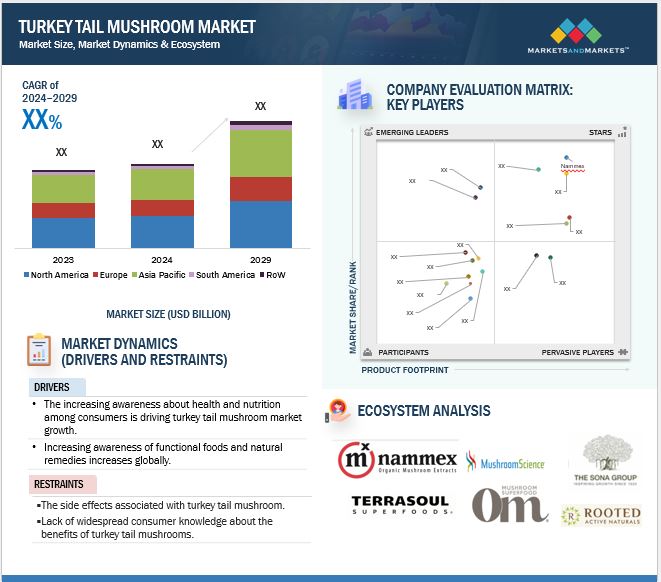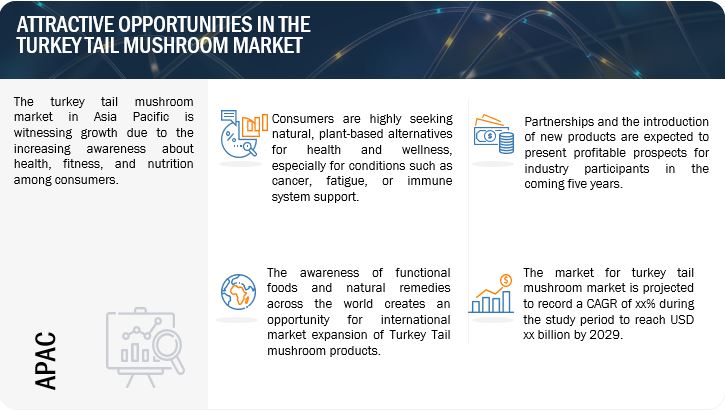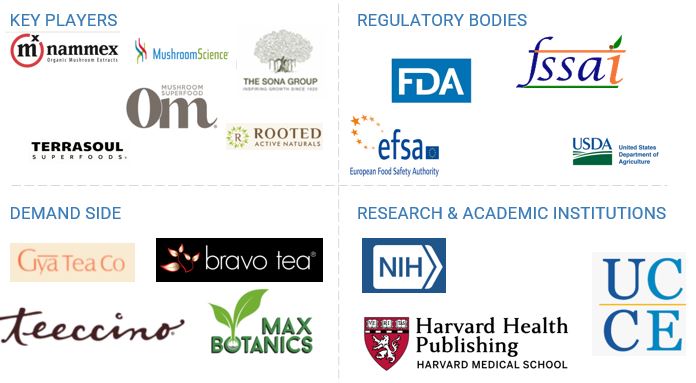Turkey Tail Mushroom Market
The global turkey tail mushroom market is projected to expand from USD xx million in 2024 to USD xx million by 2029, at a CAGR of xx% during the forecast period. The growth of the Turkey tail mushroom market is mainly led by the growing interest among consumers in natural health products, especially those that stimulate immunity and may have possible anti-cancer properties. The compound polysaccharide krestin (PSK) and polysaccharide peptide (PSP) derived from Turkey Tail mushroom attract the nutraceutical and pharmaceutical markets as they have some therapeutic effects in enhancing patient's response to cancer therapies and chemotherapy. These compounds are especially known for their immunomodulating activities, which have led to an increased popularity of Turkey Tail in dietary supplements, functional foods, and herbal medicine. As Turkey Tail mushroom has proven to be supportive in cancer treatments, specifically chemotherapy, its demand in medical and health supplement markets has gone up. The use of PSK as an adjunct to chemotherapy to improve its efficacy in cancer patients is a major factor driving the market.


Market Dynamics
Drivers: The increasing awareness about health and nutrition among consumers is driving turkey tail mushroom market growth.
Consumers are highly seeking natural, plant-based alternatives for health and wellness, especially for conditions such as cancer, fatigue, or immune system support. Among the applications of Turkey Tail in supplements, powders, teas, and capsule forms, its market size has been driven by the increasing health-conscious trends in regions such as North America, Europe, APAC, etc. Despite limited scientific evidence over its complete scope of benefits, perceived health benefits related to oncology care continue driving the growth in Turkey Tail mushroom sales. It’s generally low side effect profile versus conventional treatment helps make the mushroom even more attractive to consumers. In addition, growing awareness of its use in traditional medicine and increasing availability of standardized extracts further boost the market, supporting its expansion in the medical, dietary supplement, and functional food industries.
Moreover, as the turkey tail mushroom’s immune-modulating properties are steadily gaining traction, it becomes a highly favorable ingredient of health programs aiming to strengthen immunity. Growing chronic diseases, viral infections, and concerns over personal health are some of the most imperative factors why people are opting for a more natural solution to increase their immunity levels.
Restraints: The side effects associated with turkey tail mushroom.
The side effects of Turkey Tail mushrooms, especially in particular scenarios, can be a restrain to the growth of the market. Although generally safe for healthy adults when consumed orally, Turkey Tail has been known to have adverse effects, especially in chemotherapy patients who take Polysaccharide Krestin, an extract from the mushroom. The adverse effects include nausea and vomiting, low white blood counts, and liver problems. Although it is not known if these side effects are caused by PSK or by chemotherapy itself, the lack of clarity in its safety profile for these scenarios can keep would-be consumers from utilizing Turkey Tail products, particularly those suffering from more severe diseases. Furthermore, there are some vaginally administered Turkey Tail mushroom side effects of itching and irritation. This lack of reliable information restricts the mushroom's market expansion, especially in the personal care and feminine hygiene sectors, where safety is a primary concern. These factors collectively act as barriers to the broader acceptance and growth of the Turkey Tail mushroom market, requiring further clinical research and transparent communication to alleviate consumer concerns and foster trust.
Opportunities: Increasing awareness of functional foods and natural remedies increases globally.
The awareness of functional foods and natural remedies across the world creates an opportunity for international market expansion of Turkey Tail mushroom products. With health-conscious consumers around the world demanding holistic wellness solutions, demand for food items and supplements, that can both nourish as well as contribute to health improvement, has been on an increasing trend.
Additionally, Turkey Tail mushroom provides natural solutions to health problems, and immune-support products. Due to this Turkey Tail mushroom-based supplements, teas, and functional foods have grown dramatically following the general world health concerns surrounding the global outbreak of COVID-19. The modern consumer is increasingly searching for nature-derived immune strengtheners in order to meet these natural health imperatives, growing the marketplace even more for the Turkey Tail mushroom. Additionally, increasing demand for sustainable, plant-based, and organic products makes Turkey Tail's environmentally friendly cultivation method a plus in an environmentally conscious market.
Overall, the growing global demand for functional foods and natural medicine associated with a preventive health system and sustainability makes the Turkey Tail mushroom market a good investment opportunity. As consumers want a plant-based, sustainable, and immune-boosting, then Turkey Tail mushrooms can avail of this trend and expand across countries through online sales and partners that align health as their focus.
Challenges: Lack of widespread consumer knowledge about the benefits of turkey tail mushrooms, especially in emerging markets.
Low consumer awareness remains a strong challenge for the Turkey Tail mushroom market, preventing it from taking off to its full growth and market penetration potential. This is an area where Turkey Tail mushrooms lag some of the more well-known medicinal mushrooms, such as Reishi or Shiitake, which have better-established benefits for the immune system and reduce inflammation. Lack of awareness prevents consumers from embracing this product because they are not well-versed with the mushroom benefits and its integration into their health plans. Low awareness also explains the lack of demand needed to drive product availability in all retail channels. Both physical and online retailers prefer stocking and marketing better-known, already branded, or proven consumer favorite products. Without awareness, consumers of Turkey Tail mushrooms would find it a bit challenging for manufacturers to gain high shelf space in physical stores or visibility in electronic commerce. The product then enters the market with restricted access, making it difficult for companies to scale up their business.
Furthermore, because most consumers have no knowledge about the benefits and usage of Turkey Tail mushrooms at a school or academic level, companies need to invest more money in marketing and promoting this mushroom.
TURKEY TAIL MUSHROOM MARKET ECOSYSTEM

Prominent companies in this market include well-established, financially stable manufacturers of turkey tail mushroom market. These companies have been operating in the market for several years and possess a diversified product portfolio, state-of-the-art technologies, and strong global sales and marketing networks. Prominent companies in this market include Nammex (Canada), Aloha Medicinals (US) Mushroom Science. (US), EOS Corp., Ltd HK (Japan), TERRASOUL SUPERFOODS (US), Om Mushroom Superfood (US), Mycelium India Biotech (India), Nature Empowered (UK), Rooted Active Naturals (India), Z Natural Foods, LLC. (US), Fungi Perfecti, LLC (US), NOW Foods (US).
Based on nature, the conventional segment is estimated to grow at the highest CAGR during the studied period.
As conventional Turkey Tail mushrooms are less expensive to produce than organic varieties, making them more accessible to a broader consumer base. These facts ensure that they are common in many retail outlets that may range from supermarkets to other places from where they can be availed online. In addition, the conventional Turkey Tail can be produced on a greater quantity scale, thus increasing quantities, which is necessary with the growing demand for immuno-boosting products and wellness. With the increasing interest in functional foods and natural remedies, the conventional segment will benefit from faster market penetration because it does not face certification and cost barriers like organic products. Conventional products already have consumer trust, as most buyers prefer the effectiveness of the product over its organic certification. This is where such trust, in combination with a cost-effective and accessible market for that segment, guarantees that the conventional Turkey Tail mushrooms will keep on dominating the markets, especially for emerging markets with lower organic awareness. Therefore, the convention segment is most likely to capture a higher portion of the market due to wider distribution, cost-effectiveness, and faster market adaptation.
Based on applications, the nutraceuticals and dietary supplements segment is estimated to grow at the highest CAGR during the studied period.
Based on applications, the nutraceuticals and dietary supplements segment is estimated to grow at the highest CAGR during the studied period. As awareness about the importance of immunity and general wellness increases, particularly post-pandemic, demand for dietary supplements containing Turkey Tail mushrooms is on the rise. This is particularly more so given the fast-growing preference among consumers for functional and plant-based ingredients that offer health benefits with no artificial additives. Turkey Tail mushrooms are widely known for their rich profile of polysaccharides including PSK and PSP that support immune functionality improve gut health and act as antioxidants are in high demand in the nutraceuticals market. Further, ease of incorporation into supplement forms like caps, powders, tinctures, and teas adds to its popularity. With the rise of on-the-go health solutions, dietary supplements made from Turkey Tail mushrooms offer a convenient means to serve these health benefits to an entire clientele. This convenience coupled with preventive care has further increased the adoption of nutraceuticals and dietary supplements with this segment fast-tracking to leadership.
The Asia Pacific region is anticipated to experience rapid growth between 2024 and 2029.

The Asia Pacific region is anticipated to experience rapid growth between 2024 and 2029. Turkey Tail is one of the most potent mushrooms regarding immune-boosting properties, and antioxidant content, and thus is optimally placed to meet that demand. The main reason for such growth is the region's strong cultural affinity for natural remedies and traditional medicine. In countries such as China, Japan, and Korea, medicinal mushrooms are deeply ingrained in traditional health practices, which has naturally led to acceptance and interest in products like Turkey Tail mushrooms. Alongside this, the rapid expansion of nutraceuticals and dietary supplements in APAC also acts as fuel for the growth of Turkey Tail mushroom products. There is an increasing consciousness towards health, and prevention through natural, plant-based supplements is in demand with a greater proportion of people nowadays; in particular, among the youth who tend to maintain more fitness-oriented lifestyles. Turkey Tail mushrooms are now a popular ingredient in immune support supplements, powders, and teas as consumers seek to improve immunity and cope with stress. This allows for easy integration of functional foods into daily life.
The rising middle class and disposable income in emerging markets such as India, Vietnam, and Thailand also help drive demand for Turkey tail mushroom-based products.
Key Market Players
- Nammex (Canada)
- Aloha Medicinals (US)
- Mushroom Science. (US)
- EOS Corp., Ltd HK (Japan)
- TERRASOUL SUPERFOODS (US)
- Om Mushroom Superfood (US)
- Mycelium India Biotech (India)
- Nature Empowered (UK)
- Rooted Active Naturals (India)
- Z Natural Foods, LLC. (US)
- Fungi Perfecti, LLC (US)
- NOW Foods (US)
These market players are focusing on increasing their presence through agreements and partnerships. These companies have a strong presence in North America, Europe, Asia Pacific, South America, and RoW. They also have manufacturing facilities along with strong distribution networks across these regions.
Recent Developments
- In February 2024, Nammex (Gibson, BC, Canada) announced in a press release that it has seen an exponential increase in the amount of cultivated turkey tail mushrooms harvested by their partner farmers in the third year of its pioneering initiative to cultivate turkey tail. According to Nammex, cultivated turkey tail is more consistent in quality compared to wildcrafted supplies, and creates less pressure on the ecosystem as the mushroom sees rapid growth in demand. Turkey tail mushrooms have been used traditionally in immune support applications, and are currently being utilized more by Western healthcare practitioners, which is generating greater demand as well as raising their market value.
- In March 2021, Gaia Herbs, one of the leading natural herbal products brands in the United States, announced the launch of its new line of six mushroom capsule supplements that help to support whole-body health and maintain wellness: Respiratory Mushroom Blend, Immune Mushroom Blend, Reishi Mushroom, Lion’s Mane Mushroom, Cordyceps Mushroom, and Turkey Tail Mushroom. These products are designed to help maintain lung, immune, heart, brain and neurological health, offer energy and stamina support, stress support, and support for healthy liver function, respectively.
Frequently Asked Questions (FAQ):
What is the current size of the turkey tail mushroom market?
The turkey tail mushroom market is estimated at USD xx million in 2024 and is projected to reach USD xx million by 2029, at a CAGR of xx%.
What are the key market players, and how intense is the competition?
The key market players include Nammex (Canada), Aloha Medicinals (US) Mushroom Science. (US), EOS Corp., Ltd HK (Japan), TERRASOUL SUPERFOODS (US), Om Mushroom Superfood (US), Mycelium India Biotech (India), Nature Empowered (UK), Rooted Active Naturals (India), Z Natural Foods, LLC. (US), Fungi Perfecti, LLC (US), NOW Foods (US).
The turkey tail mushroom market is expanding rapidly, with increasing mergers, acquisitions, partnerships, and product launches. Companies in this sector are also heavily investing in research and development.
Which region is estimated to account for the largest share of the turkey tail mushroom market in 2024?
The Asia Pacific market is estimated to dominate the turkey tail mushroom market in 2024. The increasing awareness about health, fitness, and nutrition among consumers is driving the turkey tail mushroom market growth.
What kind of information is provided in the company profiles section?
The provided company profiles deliver crucial details, including a thorough business summary that covers different segments, financial results, geographic presence, revenue distribution, and business revenue breakdown. They also offer insights into product lines, key achievements, and expert analyst opinions to illustrate the company's potential better.
What are the factors driving the turkey tail mushroom market?
The awareness of functional foods and natural remedies across the world creates an opportunity for international market expansion of Turkey Tail mushroom products.
To speak to our analyst for a discussion on the above findings, click Speak to Analyst
















Growth opportunities and latent adjacency in Turkey Tail Mushroom